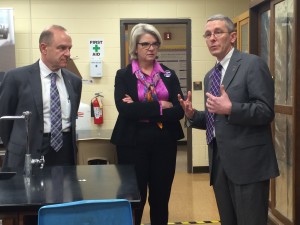UNC President, Margaret Spellings, will step down in March 2019 after only three years of leading the 17-campus university system.
The announcement was made Friday, Oct. 26, after the two-hour closed-door meeting of the UNC Board of Governors. According to the news reports, she was the one initiating the discussion for her early departure.
“All leaders are for a time,” Spellings told reporters as reported in the News & Observer. As the paper stated she later added, “Times change, and those times demand new leaders and new approaches.”

Margaret Spellings was one of the supporters for the plan to build the new science building. She visited WCU in March, 2016 as she became UNC president. She toured the Natural Science building with Chancellor, David Belcher and the Dean of College of Arts & Sciences, Richard Starnes. Photo by Bradley Lucore.
Spellings was on WCU campus on Wednesday, Oct. 24, meeting with students who are benefiting from NC Promise, the new program that reduces the cost of tuition at WCU and two other UNC institutions, Elisabeth City State University and UNC-Pembroke. The news of spellings resignation comes as WCU is starting the search for new chancellor.
“President Spellings has been instrumental in advocating for many initiatives and issues with significant impact on Western Carolina University. Her work and support on behalf of college affordability helped ensure that WCU received full legislative funding for the NC Promise tuition reduction program. She was also an influential supporter of funding for Western’s replacement steam plant,” said WCU interim-chancellor, Alison Morrison-Shetlar, in a statement.
Spellings is leaving the position well before her five-year contract expires. Triangle Business Journal reported yesterday rumors of her departure quoting a member of the BOG, Doyle Parrish, who said he believes Spellings is stepping down due to the “turbulent experience” she has had in the state’s political climate and “divisive board.”
“I think it’s been a very turbulent experience for her to navigate through the state’s political system,” he said. “Though I think she has done a fabulous job, we have a divisive board and accomplishing her goals and agendas has been difficult for her.”
Spellings become UNC president in March 2016 after the Republican-majority North Carolina university board forced out her predecessor, Tom Ross. Her first day at work, March 1, 2016, was market with student protests. She was Bush’s education secretary from 2005 to 2009 and oversaw the initial implementation of the No Child Left Behind federal education law.
As The Daily Tar Heel writes during her time at the helm of the UNC System, Spellings has advocated for college affordability and making it easier to transfer to a four-year university from a community college. In 2016, Spellings implemented a fixed tuition plan across the UNC System, which guaranteed tuition rates would remain the same through four years of continuous enrollment at a system university.
However, she was criticized for her compliance with HB2, or the bathroom law. She was also criticized by the UNC Board of Governors because of her response to the protest demanding the removal of the Confederate soldier statue, “Silent Sam” from a central spot on the flagship Chapel Hill campus.
According to the news reports the terms of her compensation agreement include regular pay and a $77,500 retirement contribution through March 1, plus a $500,000 separation payment and $35,000 in moving expenses. Spellings will also be able to serve on an outside board of directors beginning Jan. 1, according to the terms.
AP reports that Spellings’ contract outlines that she will be paid one year of salary of at least $775,000 if she’s fired without cause. She received a $90,000 incentive bonus in 2017 and another $95,000 bonus earlier this year.
Spellings’ compensation ranked 13th among U.S. public university executives in 2016-17, The Chronicle of Higher Education reported earlier in July.
Board Chairman Harry Smith said that this agreement was mutual and that it was time to transition to a new leader. Smith said an interim president will be named, and the board is in no rush to begin a search for a permanent leader.


